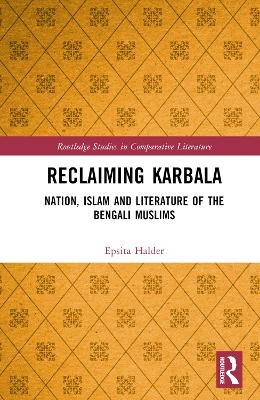
Reclaiming Karbala
Routledge (Verlag)
978-0-367-45970-3 (ISBN)
Analysing an extensive range of texts and publications across multiple genres, formats and literary lineages, Reclaiming Karbala studies the emergence and formation of a viable Muslim identity in Bengal over the late-19th century through the 1940s. Beginning with an explanation of the tenets of the battle of Karbala, this multi-layered study explores what it means to be Muslim, as well as the nuanced relationship between religion, linguistic identity and literary modernity that marks both Bengaliness and Muslimness in the region.This book is an intervention into the literature on regional Islam in Bengal, offering a complex perspective on the polemic on religion and language in the formation of a jatiya Bengali Muslim identity in a multilingual context. This book, by placing this polemic in the context of intra-Islamic reformist conflict, shows how all these rival reformist groups unanimously negated the Karbala-centric commemorative ritual of Muharram and Shī‘ī intercessory piety to secure a pro-Caliphate sensibility as the core value of the Bengali Muslim public sphere.
Epsita Halder is Associate Professor of Comparative Literature, Jadavpur University, India. She was Visiting Fellow at Max-Weber Kollege, University of Erfurt, Germany, and at the School of Oriental and African Studies, University of London, UK.
List of Figures
Acknowledgements
A Note on Transliteration and Other Conventions
List of Abbreviations
Introduction: Situating Karbala in Bengal
Chapter 1: Mapping Karbala from orality to print
Prologue
1.1 Creative application of Islamic ideas in early modern Bengal
1.1.1 Karbala in the Bengal region
1.1.2 Translation/rewriting as intertextuality, narrative as speech act
1.2 Dobhāshī: The language of the popular
1.2.1 From recitation to reading: At the threshold
1.2.2 How cheap, how scriptural: The internal ambivalence of Dobhāshī
1.3 Oral forms, scripted format: Whatever happened to the performative?
1.4 Writing as sacred ritual: Turning pain from body to book
Conclusion
Chapter 2: Print and Husayn-Centric Piety
Prologue
2.1 New sober Islam and the new authors
2.1.1 Sunna and maẓhab: Two elements of reformist sensibilities
2.1.2 From pir-centric piety to Prophet-centric piety: Muhammad as the moral template
2.2 The Caliphate and the ahl ul-bayt: Two legacies of Muhammad and his intercession
2.2.3 Namaz and the ahl ul-bayt: Muhammad’s twin treasures
2.3 Fatima, the mother of the martyrs: The template of Sabr
Conclusion
Chapter 3: The Rhetoric of Loss and Recovery: The Moment of Muslim jātīyatā
Prologue
3.1 The beginning of jātīẏatā: Bengaliness and Muslimness
3.1.1 The jātīẏa between Syed Ameer Ali and Jamāluddīn al-Afghānī
3.1.2 Anjumans, periodicals and the new print network: Affiliation, alliance and antagonism
3.2 Talking back to the Evangelists and Orientalists: Jesus versus Muhammad
3.3 The Bangla-Urdu divide: Bengali Muslims between region and nation
3.4 Literariness of jātīẏa sāhitya
Conclusion
Chapter 4: The Recovery of the Past: History and Biography
Prologue
4.1 A Hindu nationalist script and the Muslim jātīẏa
4.1.1 The search for jātīẏa: Territorial expansion and authentication
4.1.2 Writing the history of the sacred: Between Medina and Mymensingh
4.2 Jībanī/Carit as a modern genre: The contributions of Girishchandra Sen
4.3 Writing jātīẏa Itihās and jībanī as modern literature: Between the rational and the miraculous
4.4 Other histories and other biographies: Between the pan-Islamic and the province
4.5 Ummah, succession and the Karbala in jātīẏa sahitya
Conclusion
Chapter 5: Literature, Modernity, Multilinguality
Prologue
5.1 Miśra Bangla: Linguistic identity-in-difference
5.1.1 Reformist Islam and the claims over Bangla language: Āhle Hādis, Islām Darśan, Baṇgīẏa Mussalmān Sāhitya Patrikā
5.1.2 Bangla as miśra bhāshā in Muslim multilingualism
5.1.3 Redefining literary modernity: Recovery of puthis, discovery of folk
5.2 Karbala: Intra-literary reception and rejection
5.2.1 Narrative as argumentative discourse: Mohārram Kānda
5.2.2 From Mahāśmaśān Kābya to Maharam Śarīph bā Ātma-bisarjan Kābya: Kaykobad and Karbala
5.3 Poetry as Kaiphiẏat: Kārbālā Kābya and Maharam Śariph
Conclusion
Afterword: 300 Karbalas and Beyond
Bibliography
Index
| Erscheinungsdatum | 09.05.2022 |
|---|---|
| Reihe/Serie | Routledge Studies in Comparative Literature |
| Zusatzinfo | 8 Halftones, black and white; 8 Illustrations, black and white |
| Verlagsort | London |
| Sprache | englisch |
| Maße | 152 x 229 mm |
| Gewicht | 453 g |
| Themenwelt | Geisteswissenschaften ► Religion / Theologie ► Islam |
| Geisteswissenschaften ► Sprach- / Literaturwissenschaft ► Anglistik / Amerikanistik | |
| Geisteswissenschaften ► Sprach- / Literaturwissenschaft ► Literaturgeschichte | |
| Geisteswissenschaften ► Sprach- / Literaturwissenschaft ► Literaturwissenschaft | |
| Naturwissenschaften ► Geowissenschaften ► Geografie / Kartografie | |
| ISBN-10 | 0-367-45970-1 / 0367459701 |
| ISBN-13 | 978-0-367-45970-3 / 9780367459703 |
| Zustand | Neuware |
| Haben Sie eine Frage zum Produkt? |
aus dem Bereich


